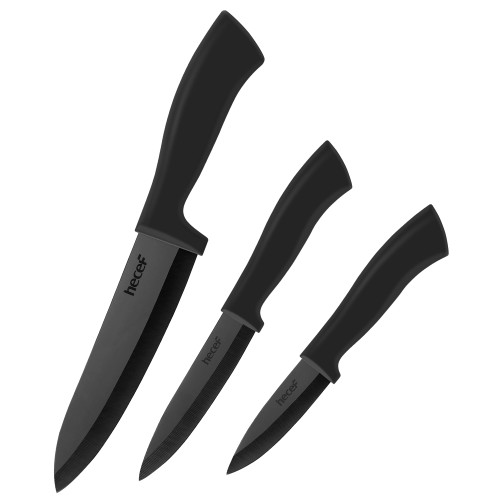UPDATE (7/1/2013): We have recently redesigned and reinforced our handles to make them more durable and comfortable when you are cutting.
This set includes our most popular 6" Chef's Knife, 5" Slicing Knife, and 4" Paring Knife. The 3-piece set covers all cutting jobs.
THE CERAMIC ADVANTAGE Imagine paper thin tomato slices or perfectly diced onions, Shenzhen Ceramic Knives give you precision slicing every time due to ceramics special material properties. The blade is made of an advanced ceramic called zirconium oxide that is much harder than steel, and second in hardness to only diamond.
Ceramic blanks are produced by dry pressing zirconia powder and subjecting the blanks through an advanced heating process called, sintering. The ceramic blanks are then sharpened and honed to a razor sharp edge and attached to the knife handle. This results in an extremely hard blade that maintains its edge approximately 10-15 times longer than steel knives. That means your ceramic knives can be used longer without resharpening.
Ceramic is also non-reactive, which means ceramic knives will not rust and are easy to clean. Because of their resistance to strong oils and acids, they wont absorb flavors or odors from foods; which wont leave any after-taste residue on foods that you slice. It also keeps fruit and vegetables from browning as quickly.
STEEL KNIVES VS CERAMIC KNIVES Unlike ceramic blades, steel blades are porous, and they can sometimes leave behind an after-taste or residue on the food youre cutting. And due to its softer material, steel blades lose their edge much quicker than a ceramic blade, and they need to be re-sharpened often. Properly cleaning steel knives to prevent rust is a must as well, as they will corrode eventually, unlike ceramic knives.
Because you cant use ceramic knives to chop or cut through bones, cheeses and other hard foods, ceramic knives will never fu











